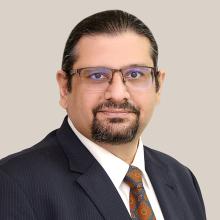Deciding on the Right CRM Solution: PAOs Need a CRM That Works for Them


Shingai Chihanya is the Assistant Technical Manager, Public Sector at the Institute of Chartered Accountants of Zimbabwe (ICAZ). Previously, he worked with the Office of the Auditor General Zimbabwe.


Shingai Chihanya
Pakistan
Mr. M. Ali Latif became a member of the IFAC SMPAG in January 2022. He was nominated by the Institute of Chartered Accountants of Pakistan (ICAP).
Mr. Latif has over 20 years of experience in the accounting & audit profession. He has served as President of the Pakistan Institute of Public Finance Accountants (2018-2019) and is currently serving as Vice President of ICAP (2020-2022). He has also served as an elected member of Regional Committee & Council of ICAP since 2009. He is a partner at M/s Muniff Ziauddin & Co., Chartered Accountants, representing BKR International.
Mr. Latif is a Fellow Member (FCA) of the Institute of Chartered Accountants of Pakistan (ICAP), a Certified Information System Auditor (CISA), and a Fellow Public Finance Accountant (FPFA).

Today, the International Public Sector Accounting Standards Board® (IPSASB®) has issued Improvements to IPSAS, 2021. The pronouncement was approved by the IPSASB in December 2021.
Improvements to IPSAS, 2021 includes minor improvements to IPSAS to address issues raised by stakeholders and minor amendments sourced from recent IFRS improvements and narrow scope projects.
About the IPSASB
The International Public Sector Accounting Standards Board (IPSASB) works to strengthen public financial management globally through developing and maintaining accrual-based International Public Sector Accounting Standards® (IPSAS®) and other high-quality financial reporting guidance for use by governments and other public sector entities. It also raises awareness of IPSAS and the benefits of accrual adoption. The Board receives support from the Asian Development Bank, the Chartered Professional Accountants of Canada, the New Zealand External Reporting Board, and the governments of Canada and New Zealand. The structures and processes that support the operations of the IPSASB are facilitated by the International Federation of Accountants (IFAC). For copyright, trademark, and permissions information, please go to permissions or contact permissions@ifac.org.
About the Public Interest Committee
The governance and standard-setting activities of the IPSASB are overseen by the Public Interest Committee (PIC), to ensure that they follow due process and reflect the public interest. The PIC is comprised of individuals with expertise in public sector or financial reporting, and professional engagement in organizations that have an interest in promoting high-quality and internationally comparable financial information.
The IAASB approved the new and revised quality management standards and issued these standards on December 17th, 2020. As a result, the IAASB needed to consider conforming and consequential amendments to the IAASB’s Other Standards and the International Framework for Assurance Engagements where they make reference to the extant quality control standards.